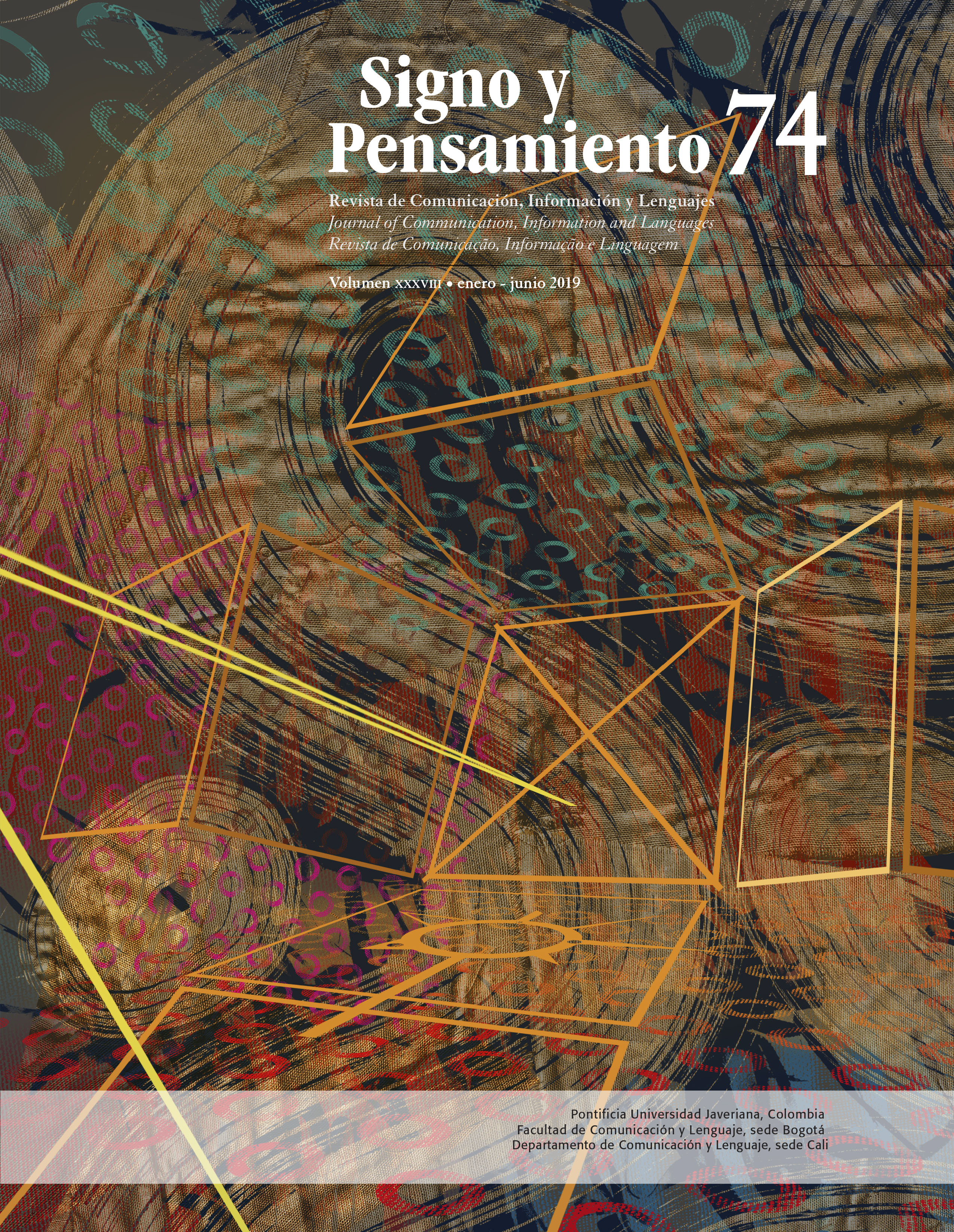Abstract
This article provides some reflections stemming from the doctorate research project concerning the “ideologhemes on the formation processes for former combatants after signing the Peace Agreement in Colombia”. This article introduces the topics and study problems dealt with by the glottopolitics, particularly from the ideologhemes. Glottopolitics as a field of knowledge linked to the sociolinguistics inquires into the linguistic practices legitimating, reproducing and transforming the social relationships and the power structures. This paper develops in three parts: a) the ideological representations of language; b) the political function of the language in dictionaries, grammar books and text manuals; and c) the linguistic policies: linguistic norms and regulations accounting for the growing interest in understanding both the language and the country language articulated with then politics.
Arnoux, E. N. de (2008a). Los discursos sobre la nación y el lenguaje en la formación del Estado (Chile, 1842-1862). Estudio glotopolítico. Buenos Aires: Santiago Arcos.
Arnoux, E. N. de (2008b). Ámbitos para el español: recorridos desde una perspectiva glotopolítica. REVERTE. Revista de Estudos e Reflexões Tecnológicas da Faculdade de Indaiatuba, 6, 1-28. Recuperado de http://reverte.fatecid.com.br/index.php/revista/article/view/25/29
Arnoux, E. N. de (2014). Glotopolítica: delimitación del campo y discusiones actuales con particular referencia a Sudamérica. En L. Zajícová & R. Zámec (Eds.), Lengua y política en América Latina: perspectivas actuales. Actas del II Coloquio Internacional de Estudios Latinoamericanos de Olomouc. Olomouc, CZ: Univerzita Palackého v Olomouci [12 de marzo de 2017, Artículo en un blog]. Recuperado de http://panhispanica.blogspot.com.co/2017/03/glotopolitica-delimitacion-del-campo-y.html
Arnoux, E. N. de (2016). Minorización lingüística y diversidad: en torno al español y al portugués como lenguas científicas. En Ministério da Cultura do Brasil & Instituto de Patrimônio Histórico e Artístico Nacional (Eds.), Anais 5. Seminário Ibero-americano da Diversidade Linguística. 17 a 20 de novembro de 2014. Foz do Iguaçu, Paraná (pp. 290-306). Brasilia: Instituto de Patrimônio Histórico e Artístico Nacional. Recuperado de http://dspace.unila.edu.br/123456789/3616
Arnoux, E. N. de, & Bein, R. (Comps.). (2010). La regulación política de las prácticas lingüísticas. Buenos Aires: Eudeba.
Arnoux, E. N. de, & Bein, R. (2015). Política lingüística y enseñanza de lenguas. Buenos Aires: Editorial Biblos.
Arnoux, E. N. de, & Del Valle, J. (2010). Las representaciones ideológicas del lenguaje: discurso glotopolítico y panhispánico. Spanish in Context, 7(1), 1-24. htttps://doi.org/10.1075/sic.7.1.01nar
Arnoux, E. N. de, & Nothstein, S. (2011). Desde Iguazú: mirada glotopolítica sobre la integración regional. En A. Fanjul & G. Da Silva Castela (Orgs.), Línguas, Políticas e Ensino na Integração Regional (pp. 38-64). Cascavel, BR: Editora Assoeste.
Del Valle, J. (2007). La lengua, ¿patria común? Ideas e ideologías del español. Madrid: Iberoamericana.
Del Valle, J. (2014). Lo político del lenguaje y los límites de la política lingüística panhispánica. Boletín de Filología, 49(2), 87-112. Recuperado de https://boletinfilologia.uchile.cl/index.php/BDF/article/view/35824/37470
Lauria, D. (abril, 2009). Los discursos sobre la lengua (1900-1910). Un abordaje desde la teoría del discurso social. Trabajo presentado en el IV Coloquio de Investigadores en Estudios del Discurso y I Jornadas Internacionales sobre Discurso e Interdisciplina, Córdoba, Argentina. Recuperado de http://www.fl.unc.edu.ar/aledar/index.php?option=comwrapper&Itemid=47
López, M. (2016). Nosotros, vosotros, ellos. La variedad rioplatense en los manuales escolares. Buenos Aires: Miño Dávila Editores.
Zaccari, V. (2010). Sobre la regulación de la ciudadanía. Análisis del objeto discursivo “idioma nacional” en textos normativos. En E. N. de Arnoux & R. Bein (Comps.), La regulación política de las prácticas lingüísticas (pp. 361-394). Buenos Aires: Eudeba.
This journal is registered under a Creative Commons Attribution 4.0 International Public License. Thus, this work may be reproduced, distributed, and publicly shared in digital format, as long as the names of the authors and Pontificia Universidad Javeriana are acknowledged. Others are allowed to quote, adapt, transform, auto-archive, republish, and create based on this material, for any purpose (even commercial ones), provided the authorship is duly acknowledged, a link to the original work is provided, and it is specified if changes have been made. Pontificia Universidad Javeriana does not hold the rights of published works and the authors are solely responsible for the contents of their works; they keep the moral, intellectual, privacy, and publicity rights.
Approving the intervention of the work (review, copy-editing, translation, layout) and the following outreach, are granted through an use license and not through an assignment of rights. This means the journal and Pontificia Universidad Javeriana cannot be held responsible for any ethical malpractice by the authors. As a consequence of the protection granted by the use license, the journal is not required to publish recantations or modify information already published, unless the errata stems from the editorial management process. Publishing contents in this journal does not generate royalties for contributors.



